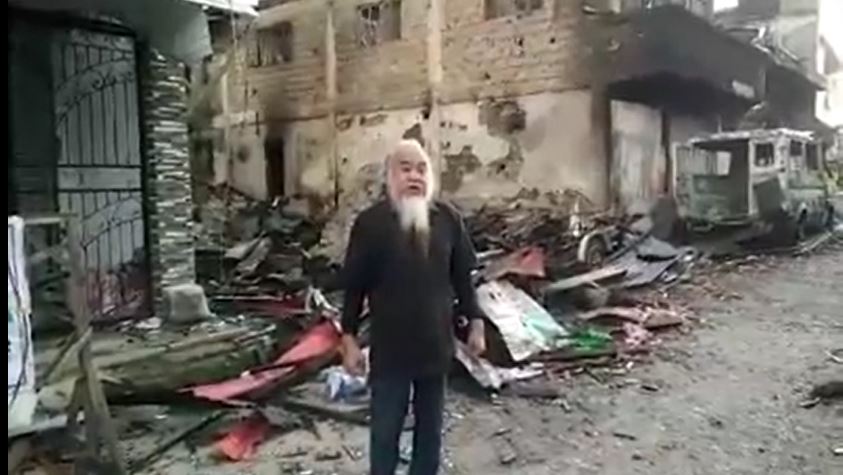
The Catholic priest abducted by the Maute terrorist group last month – in the early stages of its ongoing assault on the city of Marawi in the southern Philippines – is believed to be still alive, after his release was reportedly offered in exchange for the parents of the Maute group’s leader.
Abdullah Maute, the leader of the Islamist group, reportedly conveyed this message to a group of Muslim religious leaders who spoke with him just before an eight-hour ceasefire started to mark the end of Ramadan on Saturday (24 June). However, the Philippines Armed Forces said there were unaware of any such offer.
The government arrested both Abdullah’s mother, Ominta, and father, Cayamora, earlier this month on charges of collaborating with the terrorist group, which is led by their sons, Abdullah and Omar.
However, Justice Secretary Vitaliano Aguirre II declared yesterday (26 June) that “the government never negotiates with terrorists!”
Philippines President Rodrigo Duterte has previously said that he will not negotiate with militants aligned with the Islamic State group – Maute is one of a number of groups in the Mindanao region to have pledged allegiance to IS.
Although the Philippines is a majority-Christian country, the southern island of Mindanao, where Marawi is situated, has a strong Muslim presence and is home to a number of violent extremist groups – including Maute, Abu Sayyaf and the Bangsamoro Islamic Freedom Fighters – that all seek the island’s independence, hoping to create an independent Islamic state.
The Islamic State has been making inroads in the Philippines since Abu Sayyaf declared allegiance in 2015.
President Duterte has said that he has ordered his troops to kill the militants, even at the expense of hostages’ lives. He has vowed to “crush” IS’s presence in the country, saying: “Anyone now holding a gun, confronting [the] government with violence, my orders are spare no-one, let us solve the problems of Mindanao once and for all.”
Held hostage
A spokesman for the military told reporters yesterday that the abducted priest, Fr. Teresito “Chito” Suganob, “had been seen alive on Sunday (25 June) in a part of the city still in the hands of the extremists”.
The priest, along with some parishioners, was abducted by the Maute group when they besieged the city on 23 May. A video was later published in which the priest said he was one of around 200 people being held hostage and in which he asked the President to “consider” hostages’ lives and stop bombing the city.
According to a resident who was able to escape the city on Friday (23 June), as many as 100 Christians are still being held hostage.
Meanwhile, Al-Jazeera reported on 25 June that about 500 civilians remain trapped in areas of the city where the fighting is concentrated: “Conditions […] in Marawi have been dire, with witnesses reporting bodies on streets, food and water in short supply, and a constant threat of being killed by either the fighters or bombs dropped by government aircraft.”
Estimates for the total number of people killed so far vary between 380 and 1,000, while the government says 300,000 have been displaced.
The government also claims that at least 268 militants have been killed, eight of whom have been identified as foreign fighters from Malaysia, Indonesia, Yemen, Saudi Arabia and Chechnya in Russia. This has increased concerns that IS is seeking to establish a foothold in the region.
The fighting in Marawi was sparked by the government’s hunt for Isnilon Hapilon, the former leader of Abu Sayyaf. Hapilon is now believed to be the head of IS in the Philippines and the US government has placed a $5 million bounty on his head. (He has reportedly now left Marawi.)
The whole region of Mindanao has been under martial law since shortly after the initial siege, a decision that has been criticised by a group of religious leaders, calling it “not the proper response to terrorist attacks in just one city on a vast island”. They said it disproportionally affects the poor and does not deal with the socio-economic problems underlying the crisis.
Human shields
Last Wednesday (21 June), 200 militants from the Bangsamoro Islamic Freedom Fighters (BIFF), occupied a primary school in Malagakit village, 200km south of Marawi. Government forces pushed them out of the school, but during their retreat five civilians were taken hostage and used as human shields. No pupils were involved, as the school was closed at the time.
BIFF also destroyed the inside of a chapel in the nearby town of Pigcawayan. Cardinal Orlando Quevedo of Cotabato described the desecration of the chapel as “wicked”. “Such acts are similar to the desecration of a mosque and the sacred Quran by non-Muslims. Both desecrations are gravely sinful,” he said.
Last month, Maute militants attacked a Catholic cathedral in Marawi, causing widespread condemnation from Muslim religious and political leaders alike. Catholic news agency Fides quoted Muslim leaders as saying that “what this terrorist group has done is un-Islamic and a blatant disrespect and disregard of the teachings of Islam”.
According to UCAN, the attack on Pigcawayan displaced over 1,700 people and caused the closure of 14 schools, affecting at least 4,000 elementary and high-school students.
‘Intended to create division’
Locals said the attack on the chapel could have been intended to create division between Catholics and Muslims who currently live together peacefully, while the government said the Islamists could have been attempting to distract the military from the battle in Marawi.
From Marawi there have been reports of acts of solidarity from Muslims towards Christians, with Muslims reportedly giving Christians hijabs, hiding them in their homes, teaching them Muslim prayers and escorting them out of the city.